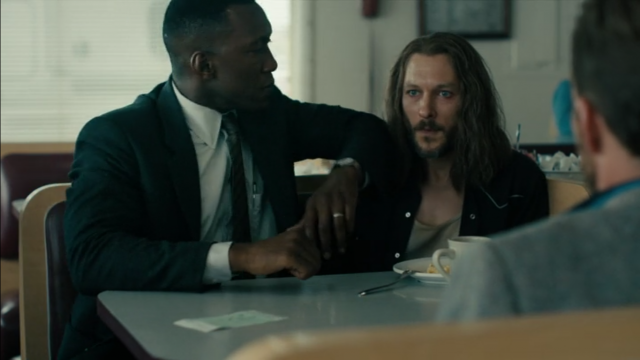Keeping the pace going from last week, “Hunters in the Dark” spends most of its time twisting through the 1990 investigation, dropping some revelations, changing the meaning of past and current actions, and generally behaving like an amped-up procedural. (T Bone Burnett’s score, which starts out indistinguishable from the sound design like No Country for Old Men and then becomes something propulsive, helps a lot.) The key theme of the hour and maybe the series, though, gets stated in two conversations with Wayne, one at the very beginning in 1980 with Amelia, and one nearer the end in 2015 with his son Henry (Ray Fisher).
Robert Penn Warren’s masterwork All the King’s Men depends too much on discovery and is generally too good to spoil, so I won’t say more than a key moment depends on someone telling a lie. That’s Wayne’s question to Henry about his affair with Elisa, the producer of True Criminal (ups and shouts to Stu Willis, who called it in the comments two weeks ago); if you tell your wife the truth, will the pain you cause your family be worth the relief of guilt to yourself? The sense of truth as something that comes with a necessary price has been with us from the beginning of the season we see it again and again here; Wayne’s 2015 investigation into himself will also come with some kind of cost, and everyone who knows him now (Henry and Roland especially) keep asking him if he wants to pay.
The episode starts with a post-sex moment, complete with cigarette, between Amelia and Wayne in 1980, and in addition to its thematic strength, it’s a testament to the chemistry between Ejogo and Ali that they’re not just convincing as lovers, but also as lovers who can’t shut off their skills at interrogation. (Their arguments and standoffs in 1990 are all prefigured in this moment; so is Wayne’s question to Henry in 2015, “did I teach you to withhold?”) Amelia wants to know about Wayne’s past, and he says “honestly, I never gave it much thought”; she calls that “a superpower.” So far, this season has been about Wayne losing that superpower, having his ability to live in and for the moment (probably something he lived most intensely as a LRRP in Vietnam) stripped away from him; and then in 2015, his more human ability to live in his memory gets taken from him too–there’s a late moment with Roland where we see he can lose everything almost in an instant. You can read the whole season as Wayne dying, the elements of his self passing away.
Pizzolatto’s theatrical instincts allow for these kind of big thematic scenes. Scoot McNairy also gets to step up and deliver some big moments, as Tom comes under heavy suspicion in 1990. Daniel Sackheim steps up his direction from “The Big Never”; long before McNairy starts screaming, he emphasizes how trapped Tom is through crowded rooms and reflections. (Also, time jumps also get signaled by reflections here.) The scenes don’t detract from the overall forward momentum, because revelations keep coming in from all directions, from Tom being gay to the hole between the children’s bedrooms having at least two different interpretations to the 1980 investigation getting shut down “for the good of the community.” There’s a neat, funny, and well-directed moment that crystallizes this feeling as first Tom, then Lucy, then a reporter, then Amelia, and then another woman go running out of the meeting where the blame gets officially placed on Woodard. “Nothing stays as it was,” like Wayne sez.
The biggest twist of “Hunters in the Dark” begins with the return of Dan O’Brien (Michael Graziadei, playing a mix of Matthew McConaughey and Doug Hutchinson, wired, funny, and more than a little creepy) in 1990, offering to reveal a major clue to the investigation, something to do with Lucy and who wanted her dead, and who possibly wants Julie dead. (He wants $7000 for what will turn out to be a single name, one more example of the cost of knowledge.) Putting the scene in a diner makes it reminiscent of Michael Mann‘s films, especially Heat and the Vincent Hanna method of dealing with informants (Ali pulls a beautiful move to keep Graziadei seated); it’s funny in the way that cop narratives often are, because one necessary part of the job is dealing with people who are full of shit on a regular basis.
True Detective has often had a problem with plausibility, of needing to get to a plot point and pulling something standard or contrived to do it; here it’s Tom getting released from jail at just the right moment and being outside just the right door to hear about O’Brien. Still, we get a tight, satisfying scene of Tom beating up O’Brien in his motel room, and the discovery of the one name O’Brien had: Hoyt, who owns the major business here, employs an ex-cop (who, by the way, went missing) as his Chief Security Officer and apparently way more, and may be the One Behind It All. The final shot of the episode is both a classic horror beat and a throwback to the Gothic evil of the first season, with the Pink Castle an even scarier version of the Yellow King, a strong setup for the final two hours.

